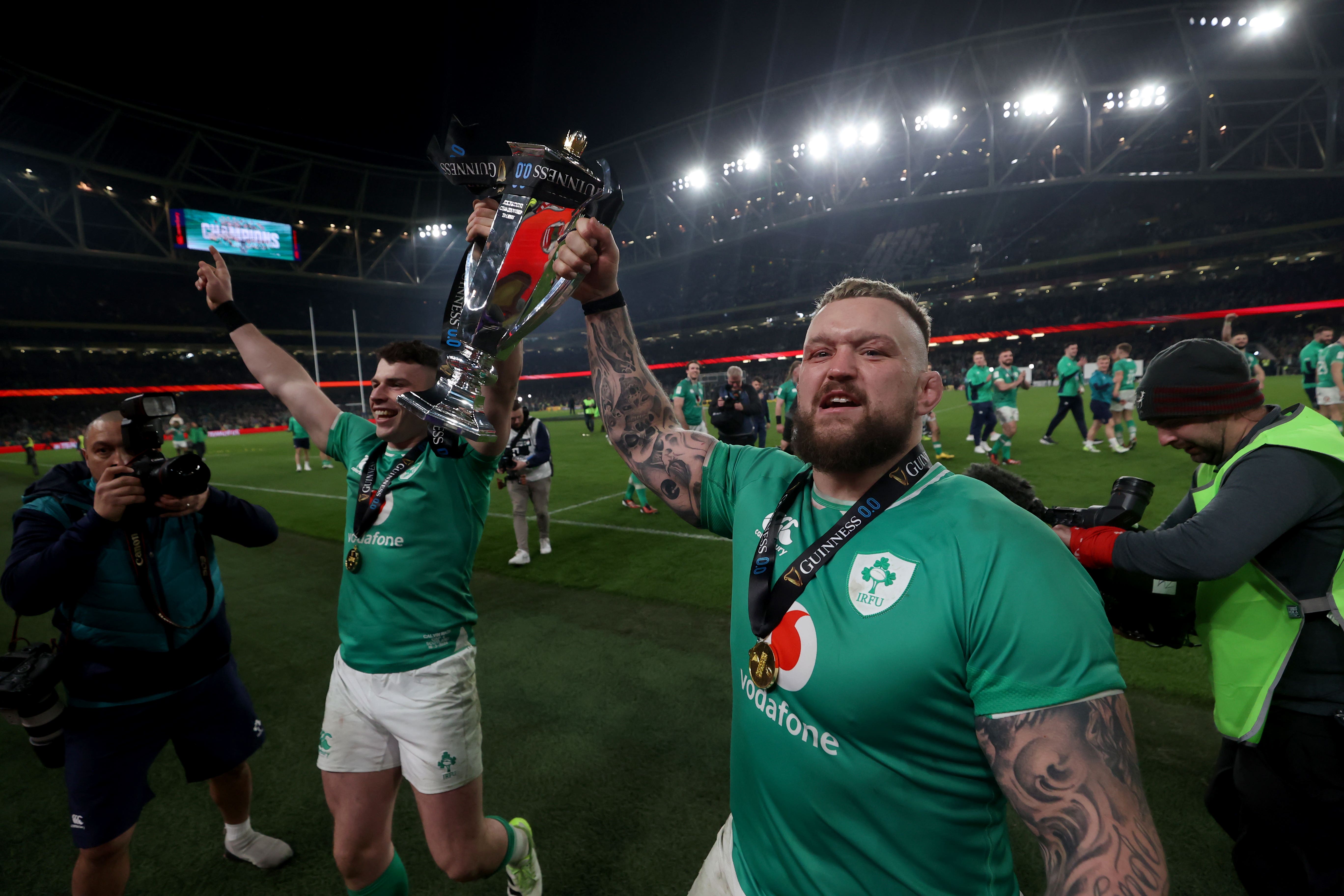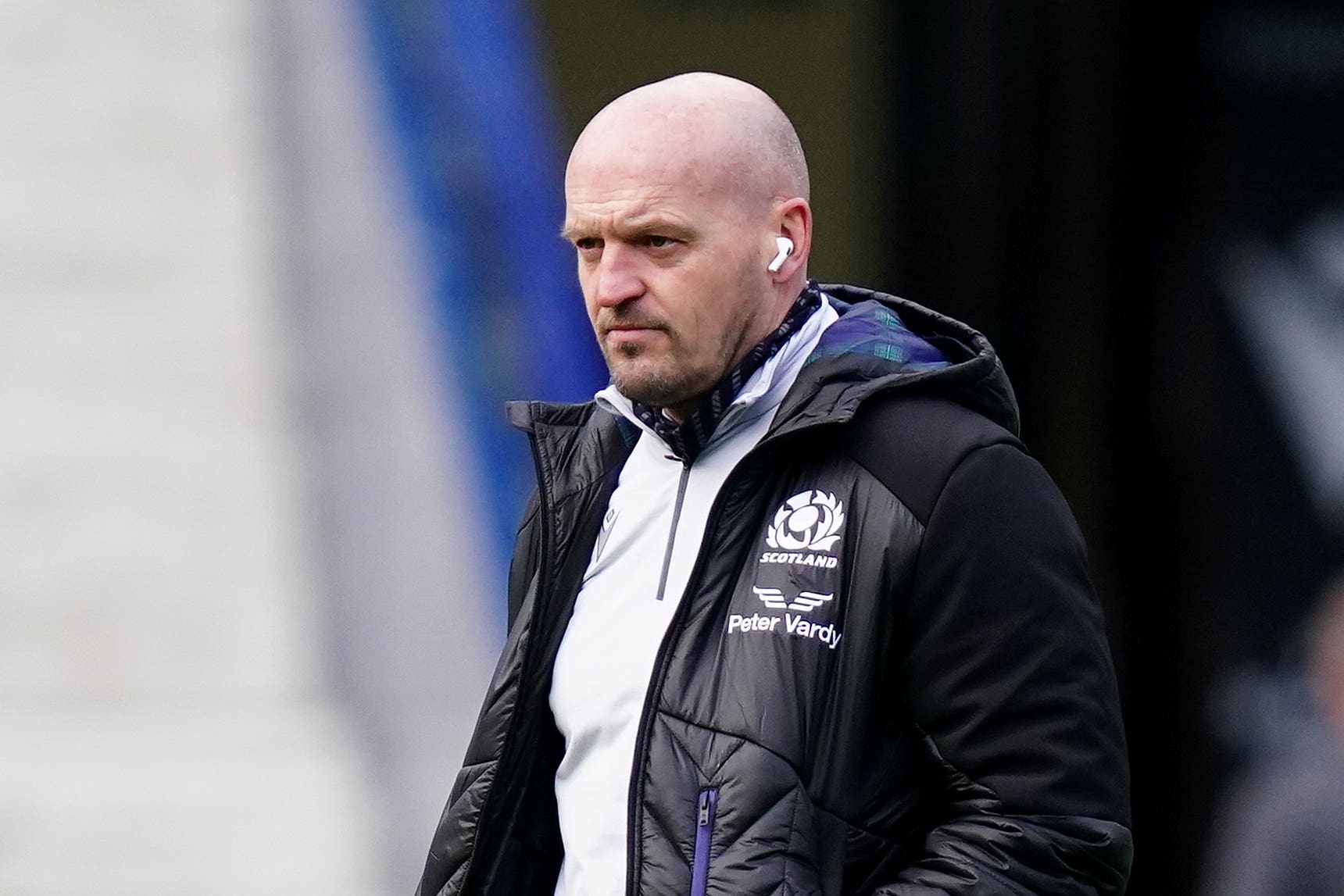The Six Nations continues to captivate – but there is one big question about the championship’s future
The television rights are up for grabs after the next edition of this grand old tournament that still thrills

It was gone one in the morning in Lyon but the fans on the last tram were still giddy as they made their way back into town, still riding the sugar rush. At the end of a captivating Six Nations, France and England had treated those inside the Groupama Stadium to a ferocious, fantastic, final fling to bring another fine edition of this spring spectacular to a close.
How does this championship do it? After round three, the suggestion was of a petering out, Ireland cruising towards consecutive triumphs and possibly a bit of history, too, with no one seemingly capable of matching them. But things are seldom that simple in the Six Nations – England’s upset at Twickenham meant a final weekend with plenty to play for and, in the end, Andy Farrell’s side crawled rather than coasted over the line.
This tournament’s enduring brilliance is partly down to just how hard it is to win. It is no fluke that no side has yet won back-to-back grand slams since Italy’s addition – beating the top sides in Europe home and away without a misstep is, and should be, mightily hard.

And it only seems to be getting harder. Ireland’s name will be etched onto the trophy but it is Gonzalo Quesada’s Azzurri who are the big winners of the campaign. For so long Six Nations also-rans, confined to the dreaded Sunday slot and beaten with a bonus point too often, Italy showed over the last two months that they are no longer a side simply capable of a shock on their day but a team of confidence, class and commitment, with a growing maturity about their young squad. Two wins should have been three, and England weren’t far from being pipped, either – certainly, their rivals can no longer take an encounter for granted.
Which does make Ireland’s nilling of them in round two all the better in retrospect. Their late stumbles may have taken the shine off Ireland’s achievement but two titles in succession should not be sniffed at, confirmation that this side are right among the best in European history. The emergence of Jack Crowley to fill Johnny Sexton’s shoes answered the big pre-tournament question, and now it will be a case of readying the squad for Farrell’s sabbatical ahead of the British & Irish Lions tour next year.
England and France had some mid-tournament anguish but will look ahead with positivity, though Scotland’s future is rather harder to parse. Managing to stay in the scrap with Ireland for so long was encouraging but it really should have a title decider in Dublin – a side short of silverware cannot afford to let chances slip in the way they did against Italy.

Welsh tumult was a predictable theme given the murky backdrop beyond Warren Gatland’s squad, their club struggles translating to the international stage and resulting in a second wooden spoon of the Six Nations era. Gatland feels his callow core will be better for the experience but fans are probably right to wonder if the scarring will prevent a talented bunch coming good.
Each and every nation provided plenty of thrills. How about that Welsh resurrection in Cardiff on the opening weekend, giving Scotland an almighty fright by leaping out of the coffin just after the final nail appeared to have been hammered in? Or, a week later, the Sam Skinner try that wasn’t, a failure to find footage conclusively showing a score ultimately pivotal to the pattern of the tournament?
The pumping pistons of Duhan van der Merwe, James Lowe and Tommaso Menoncello were a sight to see, while Ange Capuozzo, Uini Atonio and Ryan Baird showed that rugby remains a game for all sizes.

And all of it available to watch via terrestrial television, which may not be the case for much longer. This marked the penultimate year of the BBC and ITV’s shared broadcast agreement in the United Kingdom, with tentative discussions already under way as to what the future television deal for the tournament will look like.
Commercially, the men’s Six Nations remains a real heavyweight at a time when some other rugby properties are struggling for traction. With a revamped Nations Championship on the way, there is a thought that a bundling of properties may be wise to try and seek a mega-deal from a major subscription service with the sort of deep pockets their free-to-air counterparts lack.
What that might mean for rugby’s grandest championship is unclear but a total abandonment of terrestrial television would surely be unwise. Ollie Lawrence spoke well after England’s defeat on Saturday about how watching Manu Tuilagi as a youngster had helped set him on a rugby journey that led to him partnering the centre in what might well have been his final moments at Test level. As wide an audience as possible is surely desirable to allow a kid in Cardiff, Coventry or Kirkcaldy to live out those same dreams.
Making the key decision will be Tom Harrison, a man of mystery in his first 11 months as Six Nations chief executive before a long-awaited media briefing last week. Things ended messily at the England and Wales Cricket Board (ECB) for Harrison but he retains serious clout in the media rights realm, having forged a successful career after concluding his cricketing career.

“I think in any sporting environment, particularly a journey of development, visibility is really important,” said Harrison on Wednesday. “The free-to-air space is all about balancing revenue – when you’re looking at sport as a whole. It’s about revenue reach and relevance and balancing those things. In each case, there is a requirement to treat – very, very carefully – decisions around how you move that balance.
“In cricket, we moved it back towards free-to-air, we took free-to-air back into the space. Rugby’s got a huge free-to-air component to it, particularly the men’s Six Nations, and the Women’s Six Nations as well. We understand the role that that plays in taking the game to new fans. To make it available is really important going forward. We’re going to have to look at that as a key question mark for us.”
Join our commenting forum
Join thought-provoking conversations, follow other Independent readers and see their replies
Comments
Bookmark popover
Removed from bookmarks